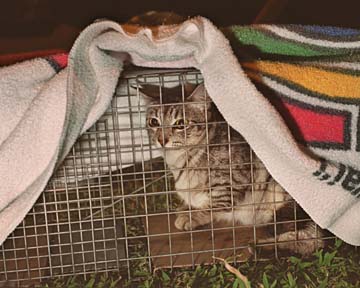Advertisement - Click to support our sponsors.


Rep. Schatz joins cat-
By Lori Tighe
trapping efforts
Star-BulletinThe gray cat crept into the cage to lick the raw fish, and the back door suddenly dropped. Then cage and cat started shaking like a washing machine in spin cycle.
"Sorry, sweetheart," said Stacy Ozaki, 29, who would rather spend a weeknight helping cats than watching "Ally McBeal." She covered the cage with a towel and the cat calmed down instantly.
Ozaki traps feral cats several times a week around Oahu, takes them to the Hawaiian Humane Society for neutering, then returns them to their home on the streets.
"The successful way to solve the feral cat problem is to neuter them, because they're very territorial. If you take them off the street, other cats will just move into their place," she said, while pulling more steel cages off her black truck bed and baiting them with tuna.
Last night at 1710 Makiki St. was a "trapping" night with Rep. Brian Schatz in attendance. Ozaki, co-founder and president of the volunteer nonprofit Abandoned & Feral Cat Foundation, and Schatz are trying to persuade the Department of Health not to ban the public from feeding feral cats. The department is in the midst of developing the rule to reduce the feral cat population estimated to be in the tens of thousands.
Schatz was wearing shorts, a T-shirt and slippers. Ozaki handed him a trap and put him to work.
"I want to help, but it looks like hunting," he joked.
Then he said earnestly, "This seems like the no-brainer solution. The better way is to feed them, have them trust you, neuter them and return them," where their population will shrink eventually.
"These people would be breaking the law if they fed them," Schatz said, nodding to several volunteers who showed up for the trapping, such as Josephine Chay.
Chay, a longtime social studies teacher at Farrington High School, feeds about 40 cats every morning at Kakaako Park with dry cat food she buys at Costco for $6.29 per 20-pound bag. She buys the wet food when it goes on sale. She's done this for four years.
"It gives me an awful lot of pleasure. I don't drink, I don't smoke. My van is 8 years old and my sneakers aren't Adidas," Chay said.
They chose the Makiki Street location because an elderly woman, who wished not to be named, feeds the cats regularly. Sure enough, just as dusk ended cats began peeking out from under cars and dancing into shadows.
"At first blush, it seems the right thing to say is let's just stop feeding them. But cats are smart enough to know if one of their friends doesn't return, they won't trust people anymore," Schatz said.
Ozaki's group of 30 volunteers include an accountant, a professor and a producer -- "It's not the old crazy cat woman with purple hair doing this," she said. They've trapped and neutered nearly 400 cats in seven months. Ozaki herself manages a law firm downtown.
One female cat alone can exponentially produce 10,000 cats in seven years by her kittens and grand-kittens producing, Ozaki said.
"The source of the problem is people who dump their cats on the street," she said.
"We need to raise the level of awareness for neutering. Cat lovers and cat haters are working toward the same goal. We appeal to both groups," she said, smiling at the irony.
Neutering and returning cats is more humane then letting them fend for themselves or destroying them, she said.
Tensions ran high among the volunteers when oncoming car lights illuminated the silhouette of a cat trying to cross the street.
"Oh no, sweetie. Don't do it," Ozaki said. Then the small group of about six people exhaled when the cat held back and waited until the last car passed to cross safely.
"That's why we're doing this," Ozaki said, "to prevent that."
You can track bills, hearings and other Legislature action via: Get involved
The Legislative Reference Bureau's public access room, state Capitol, room 401. Open 8 a.m. to 6 p.m. Monday to Friday, and 8 a.m. to 2 p.m. Saturday. Phone: 587-0478; fax, 587-0793; TTY, 538-9670.
Neighbor islanders, call toll-free and enter ext. 70478 after the number:
Big Island, 974-4000; Maui,
984-2400; Kauai, 274-3141;
Molokai and Lanai, 468-4644.
The state's daily Internet listing of hearings: http://www.capitol.hawaii.gov
The Legislature's automated bill report service: 586-7000.
The state's general Web page: http://www.state.hi.us
Our Web site: https://archives.starbulletin.com
Legislature Directory
Hawaii Revised Statutes
Legislature Bills